英语四种基本句式
英语四种基本句式

英语四种基本句式:陈述、疑问、祈使和感叹句He goes to school.I am not a boy. He does not go to school.Are you a student? Do you / Does she like English ?What time (is it),please ? which is your pen?what date is it today? 问日期This is a book. Is this a book? __ yes, it is / no, it isn’tI like English.I do not like English. Do you like English? What do you like?Does she like English. What does she like ?When 问时间who 问人whose 问主人where问地点which 问选择why问原因what time问时间what color 问颜色what about 问意见what day问星期what date问日期what place 问具体地点How 问情况how old 问年龄how many/much问数量、价钱how about问意见how far 问路程how often 问频率1.some变为any。
如:There are some birds in the tree.→There aren't any birds in the tree.但是,若在表示邀请、请求的句子中,some可以不变。
如:Would you like some orange juice?与此相关的一些不定代词如something, somebody等也要进行相应变化。
2.and变为or。
如:I have a knife and a ruler.→I don't have a knife or a ruler.You needn’t worry about the job and pay._ You needn’t worry about the job or pay. (Don’t need to)3.a lot of (=lots of)变为many(修饰可数n)或much(修饰不可数n)。
英语句子的五种基本结构
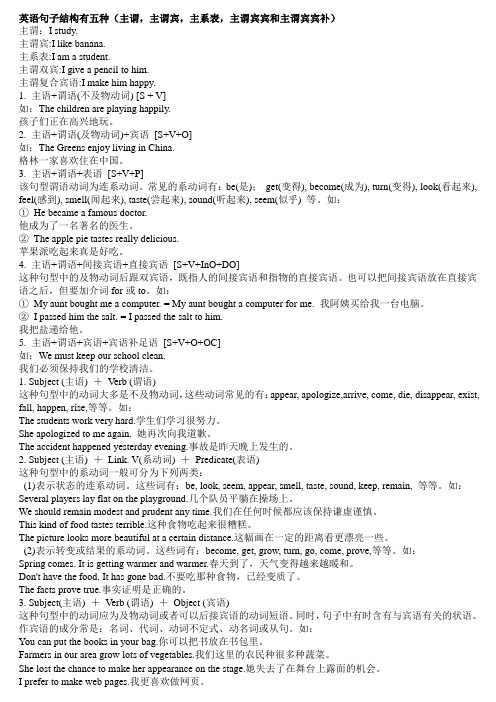
英语句子结构有五种(主谓,主谓宾,主系表,主谓宾宾和主谓宾宾补)主谓:I study.主谓宾:I like banana.主系表:I am a student.主谓双宾:I give a pencil to him.主谓复合宾语:I make him happy.1. 主语+谓语(不及物动词) [S + V]如:The children are playing happily.孩子们正在高兴地玩。
2. 主语+谓语(及物动词)+宾语[S+V+O]如:The Greens enjoy living in China.格林一家喜欢住在中国。
3. 主语+谓语+表语[S+V+P]该句型谓语动词为连系动词。
常见的系动词有:be(是);get(变得), become(成为), turn(变得), look(看起来), feel(感到), smell(闻起来), taste(尝起来), sound(听起来), seem(似乎) 等。
如:①He became a famous doctor.他成为了一名著名的医生。
②The apple pie tastes really delicious.苹果派吃起来真是好吃。
4. 主语+谓语+间接宾语+直接宾语[S+V+InO+DO]这种句型中的及物动词后跟双宾语,既指人的间接宾语和指物的直接宾语。
也可以把间接宾语放在直接宾语之后,但要加介词for或to。
如:①My aunt bought me a computer. = My aunt bought a computer for me. 我阿姨买给我一台电脑。
②I passed him the salt. = I passed the salt to him.我把盐递给他。
5. 主语+谓语+宾语+宾语补足语[S+V+O+OC]如:We must keep our school clean.我们必须保持我们的学校清洁。
1. Subject (主语) +Verb (谓语)这种句型中的动词大多是不及物动词,这些动词常见的有:appear, apologize,arrive, come, die, disappear, exist, fall, happen, rise,等等。
四种句子:陈述句讲解+练习(零基础精讲)

陈述句—基础精讲及练习(附解析)一. 陈述句的概念陈述句是陈述一个事实或者说话人的看法。
包括肯定句和否定句两种。
陈述句在书写时句末用句号,而在朗读时则用降调。
如:I’m a student.我是一个学生。
I like dogs.我喜欢狗。
I’m not a teacher.我不是一名老师。
二. 陈述句的句子结构以及用法陈述句包括肯定句和否定句两种。
即“肯定陈述句”和“否定陈述句”两种,简称为肯定句和否定句。
(一)肯定句英语中,一般情况下,肯定句的基本结构为:主+谓+其他,例如:I like English.我喜欢英语。
主语:I 我谓语:like 喜欢主语:一般由人称代词或名词充当,如:I, you, he, she, dog, cat, books等.谓语:有两类①be动词(is,are,am):是②行为动词:like“喜欢”, eat“吃”等例如:Mr.Walker is an Englishman.华克先生是英国人。
I am a tall boy.我是一个高的男孩。
He does his homework.他做他的作业。
(二)否定句否定句的基本形式包括以下两种:(1)直接在动词后加not进行否定:①情况一:谓语动词是be动词(be动词:am/is/are)例如:I am not(缩写:I’m not) a good swimmer.我不是一个游泳的好手。
He is not(缩写:isn’t) a doctor.他不是一个医生②情况二:谓语动词是情态动词(如:can/may/must/shall/will等)例如:I will not(缩写:won't)do it again.我不会再做这种事。
The old man can not(缩写:can’t/cannot)find his way home.那个老人找不到回家的路。
I could not(缩写:couldn’t)sleep last night.昨夜我无法入睡。
英语句子五种基本句型
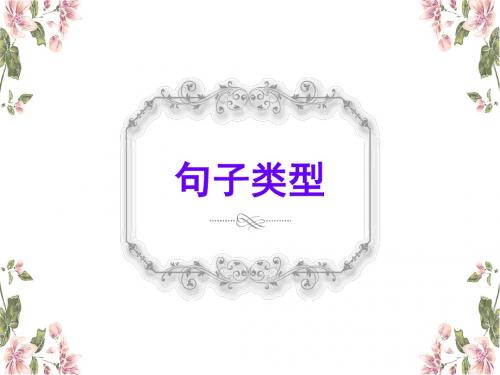
特别提示: 作状语时,是用现在分词还是用过去分词, 取决于该动词与句子主语之间的关系。 过去分词作状语,与句子主语之间在逻辑上 是动宾关系;现在分词作状语,句子主语与 它之间在逻辑上是主谓关系。
4. 独立成分作状语 有些分词或不定式短语作状语,其形式的选择不 受上下文的影响,称作独立成分。 常见的有: generally speaking... 一般说来…… frankly speaking... 坦白地说…… to be honest/frank 坦白说 judging from/by... 根据……来判断 considering... 考虑到…… believe it or not 信不信由你
五、主语+及物动词+宾语+宾语补 足语 They made him their monitor. We consider him very capable. They call her Anne.
句子成份练习
1、You should study hard. 3、The boy told me his story. 5、The sun keeps us warm.
句子类型
句子种类两种分类法
1、按句子的用途可分四种:
1)陈述句(肯定、否定):
He is six years old.
She didn’t hear of you before.
2)疑问句(一般、特殊、选择、反意):
Do they like skating?
How old is he?
Is he six or seven years old?
简单句的五种基本句型:
一、主语+不及物动词
Spring is coming.
This factory opened in 1989.
英语四种常用时态
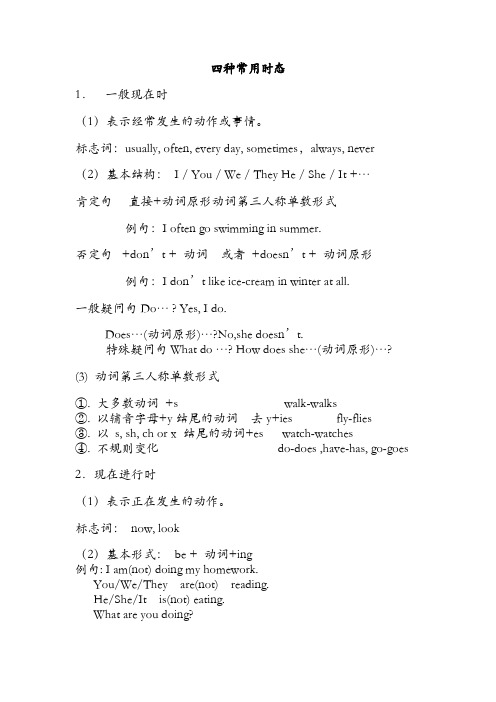
四种常用时态1.一般现在时(1)表示经常发生的动作或事情。
标志词:usually, often, every day, sometimes,always, never (2)基本结构:I / You / We / They He / She / It +…肯定句直接+动词原形动词第三人称单数形式例句:I often go swimming in summer.否定句+don’t + 动词或者+doesn’t + 动词原形例句:I don’t like ice-cream in winter at all.一般疑问句Do… ? Yes, I do.Does…(动词原形)…?No,she doesn’t.特殊疑问句What do …? How does she…(动词原形)…?(3) 动词第三人称单数形式①. 大多数动词+s walk-walks②. 以辅音字母+y结尾的动词去y+ies fly-flies③. 以s, sh, ch or x 结尾的动词+es watch-watches④. 不规则变化do-does ,have-has, go-goes 2.现在进行时(1)表示正在发生的动作。
标志词:now, look(2)基本形式:be + 动词+ing例句: I am(not) doing my homework.You/We/They are(not) reading.He/She/It is(not) eating.What are you doing?Is he reading?(3)动词的现在分词形式(do+ing)①. 大多数动词+ing walk—walking②. 以e结尾的动词去e+ing come—coming③. 重读闭音节单词,末尾只有一个辅音字母双写最后一个辅音字母再+ing run-running swim-swimming 3. 一般过去时态(1)表示过去已经发生的事情。
英语句子四种基本类型
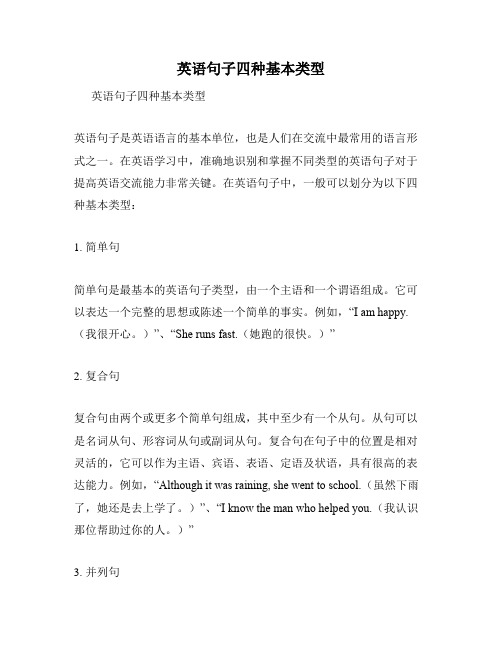
英语句子四种基本类型英语句子四种基本类型英语句子是英语语言的基本单位,也是人们在交流中最常用的语言形式之一。
在英语学习中,准确地识别和掌握不同类型的英语句子对于提高英语交流能力非常关键。
在英语句子中,一般可以划分为以下四种基本类型:1. 简单句简单句是最基本的英语句子类型,由一个主语和一个谓语组成。
它可以表达一个完整的思想或陈述一个简单的事实。
例如,“I am happy.(我很开心。
)”、“She runs fast.(她跑的很快。
)”2. 复合句复合句由两个或更多个简单句组成,其中至少有一个从句。
从句可以是名词从句、形容词从句或副词从句。
复合句在句子中的位置是相对灵活的,它可以作为主语、宾语、表语、定语及状语,具有很高的表达能力。
例如,“Although it was raining, she went to school.(虽然下雨了,她还是去上学了。
)”、“I know the man who helped you.(我认识那位帮助过你的人。
)”3. 并列句并列句指两个或多个简单句被连接成一个句子,这些简单句是平等并列的关系。
它们之间通常使用连词进行连接。
例如,“I like coffee, but she prefers tea.(我喜欢咖啡,但她更喜欢茶。
)”、“He is not only tall but also handsome.(他不仅高大,而且很帅气。
)”4. 主从复合句主从复合句由一个主句和一个或多个从句组成,从句在主句中充当不同的语法角色,如主语、宾语、表语、定语和状语等。
主从句之间具有层次性和逻辑性,常使用引导从句的连词(如that, if, unless, because 等)。
例如,“I will go t o the cinema if I have time.(如果有时间,我会去电影院。
)”、“He told me that he was sick.(他告诉我他生病了。
句子的四种基本结构

句子的四种基本结构句子是语言沟通的基本单位,它由词汇和语法规则组成,通过不同的结构表达不同的含义和关系。
在英语中,句子可以分为四种基本结构:简单句、并列句、复合句和复合并列句。
下面将逐一介绍这四种基本句子结构及其特点。
简单句是最基本、最简洁的句子结构,它由一个主语和一个谓语构成,可以包含宾语或其他附属成分。
简单句通常用来表达一个完整的思想或陈述一个事实。
例如:1. Mary sings beautifully. (简单句)玛丽唱得非常好。
2. Tom and Jerry are good friends. (简单句)汤姆和杰瑞是好朋友。
并列句是由两个或多个独立的简单句通过连词连接而成,它们之间没有从属关系。
并列句可以用来表达两个独立的思想或平行的动作。
常见的并列连词有and、but、or等。
例如:1. She is beautiful and intelligent. (并列句)她既漂亮又聪明。
2. I want to go to the movies, but it's raining outside. (并列句)我想去看电影,但外面下雨了。
复合句是由一个主句和一个或多个从句构成,从句可以充当主句的主语、宾语、定语或状语。
复合句常用来表达因果关系、条件关系、时间关系等复杂的逻辑关系。
例如:1. The book that I borrowed from the library is very interesting. (复合句)我从图书馆借来的那本书非常有趣。
2. If you work hard, you will succeed. (复合句)如果你努力工作,你将会成功。
复合并列句是由并列句中的一个或多个简单句变为复合句构成,从而形成并列结构的复合句。
这种句子结构既包含并列关系,又包含主从关系,通过适当的连接词和引导词来连接各个句子。
例如:1. Peter likes to swim, and his brother prefers to play basketball. (复合并列句)彼得喜欢游泳,而他的弟弟更喜欢打篮球。
英文加减乘除四种表达方式
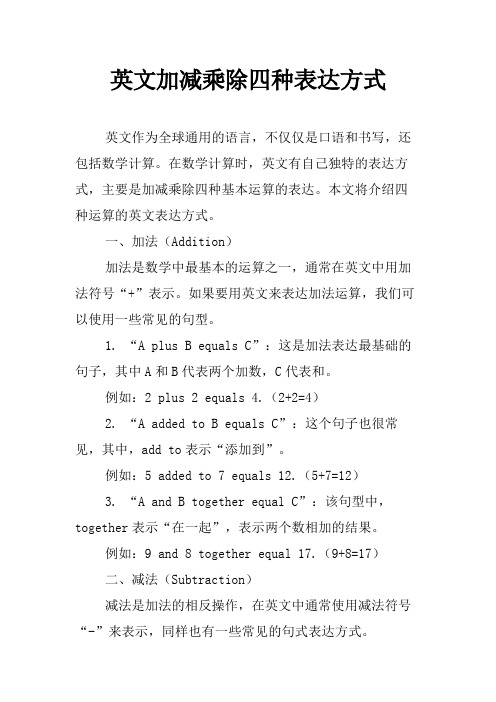
英文加减乘除四种表达方式英文作为全球通用的语言,不仅仅是口语和书写,还包括数学计算。
在数学计算时,英文有自己独特的表达方式,主要是加减乘除四种基本运算的表达。
本文将介绍四种运算的英文表达方式。
一、加法(Addition)加法是数学中最基本的运算之一,通常在英文中用加法符号“+”表示。
如果要用英文来表达加法运算,我们可以使用一些常见的句型。
1. “A plus B equals C”:这是加法表达最基础的句子,其中A和B代表两个加数,C代表和。
例如:2 plus 2 equals 4.(2+2=4)2. “A added to B equals C”:这个句子也很常见,其中,add to表示“添加到”。
例如:5 added to 7 equals 12.(5+7=12)3. “A and B together equal C”:该句型中,together表示“在一起”,表示两个数相加的结果。
例如:9 and 8 together equal 17.(9+8=17)二、减法(Subtraction)减法是加法的相反操作,在英文中通常使用减法符号“-”来表示,同样也有一些常见的句式表达方式。
1. “A minus B equals C”:其中A和B代表被减数和减数,C代表差。
例如:6 minus 3 equals 3.(6-3=3)2. “B subtracted from A equals C”:其中,subtracted from表示“减去”,A代表被减数,B代表减数,C代表差。
例如:10 subtracted from 15 equals 5.(15-10=5)3. “A take away B equals C”:其中,take away 表示“拿走”,A代表被减数,B代表减数,C代表差。
例如:20 take away 15 equals 5.(20-15=5)三、乘法(Multiplication)乘法是将两个或更多的数相乘,通常使用乘法符号“×”来表示,在英文中有一些常见的句式表达方式。
倒装句的四种基本句型例句英语
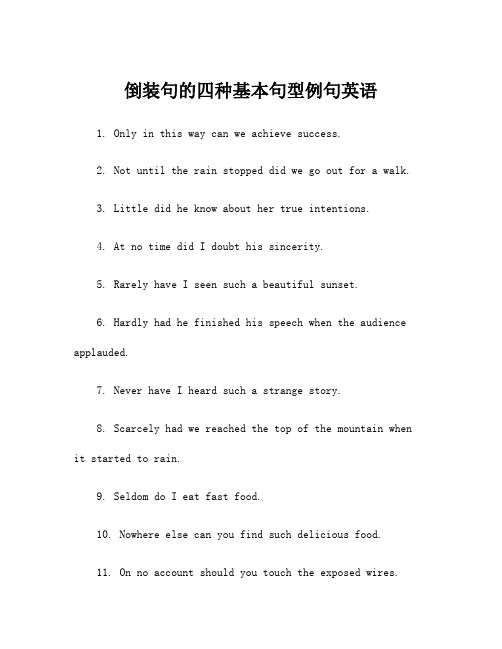
倒装句的四种基本句型例句英语1. Only in this way can we achieve success.2. Not until the rain stopped did we go out for a walk.3. Little did he know about her true intentions.4. At no time did I doubt his sincerity.5. Rarely have I seen such a beautiful sunset.6. Hardly had he finished his speech when the audience applauded.7. Never have I heard such a strange story.8. Scarcely had we reached the top of the mountain when it started to rain.9. Seldom do I eat fast food.10. Nowhere else can you find such delicious food.11. On no account should you touch the exposed wires.12. In no way can we accept your proposal.13. Under no circumstances should we reveal our plan.14. In vain did she try to solve the complicated math problem.15. By no means should you leave the door open.16. Not only did he lose his keys, but he also forgot his wallet.17. Here comes the bus.18. There goes the bell.19. Up went the hand of the young student.20. Off she ran to catch the train.21. Through the doorway stepped the man in a black suit.22. Down the hill tumbled the little girl.23. In rushed the crowd when the doors opened.24. Over the mountains soared the eagle.25. Out jumped the frog from the pond.26. Back came the cat after chasing the birds.27. In glided the swan across the calm lake.28. Up sprang the flowers after the rain.29. Off swept the wind, leaving a trail of fallen leaves.30. To the market went the farmer to sell his produce.31. Under the bridge ran the river, clear and fast.32. Up above floated the colorful hot air balloons.33. Over the roof flew the flock of birds.34. Beyond the trees lies a hidden treasure.35. Away she went, leaving behind a trail of dust.36. From the fridge, she took out some fresh vegetables.37. By the beach, the children built sandcastles.38. In the distance, a faint sound of music could be heard.39. In a flash, the car zoomed past us.40. In the corner of the room stood a small table.41. Inside the box was a beautifully wrapped gift.42. Near the river, a family of ducks swam peacefully.43. Off the coast, the dolphins playfully leaped out of the water.44. On his desk, he stacked piles of books.45. On the wall hung a large portrait of the queen.46. Over the centuries, many civilizations have risen and fallen.47. Through the window, the warm sunlight streamed into the room.48. To the left of the house, there is a vibrant garden.49. Underneath the bed, we found a lost puppy.50. Upstairs, the children were busy studying for their exams.51. With a flash of lightning, the storm began.52. Without hesitation, he dived into the deep water.53. On the stage stood a magnificent grand piano.。
初中英语语法 五种基本简单句型讲解
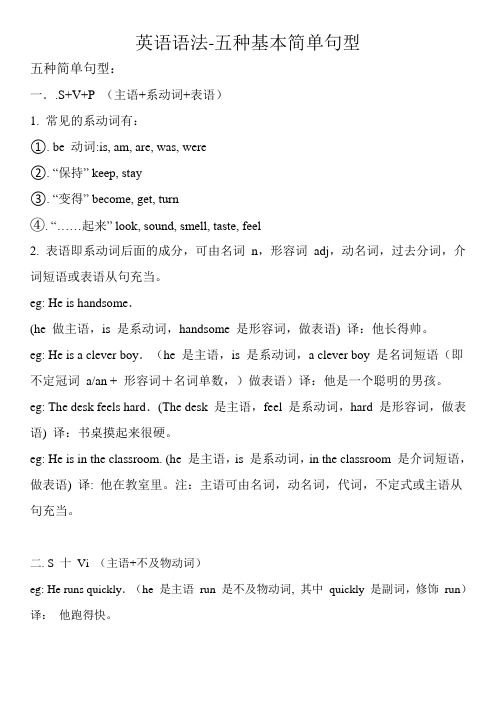
英语语法-五种基本简单句型五种简单句型:一..S+V+P (主语+系动词+表语)1. 常见的系动词有:①. be 动词:is, am, are, was, were②. “保持” keep, stay③. “变得” become, get, turn④. “……起来” look, sound, smell, taste, feel2. 表语即系动词后面的成分,可由名词n,形容词adj,动名词,过去分词,介词短语或表语从句充当。
eg: He is handsome.(he 做主语,is 是系动词,handsome 是形容词,做表语) 译:他长得帅。
eg: He is a clever boy.(he 是主语,is 是系动词,a clever boy 是名词短语(即不定冠词a/an + 形容词+名词单数,)做表语)译:他是一个聪明的男孩。
eg: The desk feels hard.(The desk 是主语,feel 是系动词,hard 是形容词,做表语) 译:书桌摸起来很硬。
eg: He is in the classroom. (he 是主语,is 是系动词,in the classroom 是介词短语,做表语) 译: 他在教室里。
注:主语可由名词,动名词,代词,不定式或主语从句充当。
二. S 十Vi (主语+不及物动词)eg: He runs quickly.(he 是主语run 是不及物动词, 其中quickly 是副词,修饰run)译:他跑得快。
eg: My ink has run out.(my ink 是主语,run out 是一个不及物的动词词组,has run out 是现在完成时的结构) 译:我的钢笔水用完了。
注:不及物动词:字典里词后标有vi. 的就是不及物动词。
不及物动词后不能直接跟有动作的对象(即宾语)。
若要跟宾语,必须先在其后添加上某个介词,如to, of,at 后才可以接宾语。
高中英语语法定语从句的四种基本句式
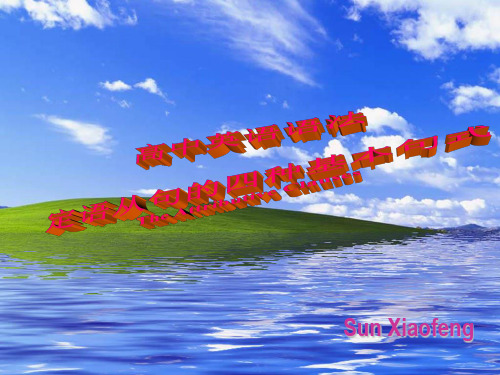
定 句语式从四句、的 定四语种从句式的四种句式
先行词 whose 名词 +谓语 +
先行词’s
123.TTPhlheiesaysberouposkahsiessdmfoervtethhreetobstohuoedklpewntthsoewsmehacoonsever 归niwsah纳gtoirv:seeeWnlcah.anorgsheua通adg常ebri指sokn人eo,nt Ed也no可wglni指s.h物. ,
句
定 句语式从三句、的 定四语种从句式的四种句式
when where
先行词 why 主语 +谓语 +(状语)
介词+先行词
归123.纳ITSs:htaie1lnl.r先greeha行mas词oienim在swtb从hhe句ery/c中tfihot担eyr 任dwa状hyie语cwrhe时h/hie用nenww/ohhnaeirsceh I wabhassiecbnh/otwIrihsnfei.tnrh/swathtcyha或me “ge介ott词oat+hcwiohslidcshc.”h引oo导l.定从.
hose/that
where/when/why
目录
句式一、定语从句的四种句式
先行词 who/that/which谓语动词
1.The boys who/that are playing football are from Class One. 2.Football is a game that/which is liked by most boys. 归纳:先行词在从句中担任主语时用
基本英语语法大全

“BY+逻辑主语”是一个介宾短语。 此介词短语的位置可以被提前到 谓语和主语补足语之间。 I am advised by my teacher to learn English. He was asked by his mother to wash his clothes.
基本英语语法大全
被动句系列 被动句型分为四种:
(一)被动基本句型(主+BE+过去 分词+BY+逻辑主语)
主动宾句型:I drive that car.
被动基本句型:That car is driven by me
主动宾句型:The students do the homework
被动基本句型:The home is done by the stude基n本t英语s语法大全
基本英语语法大全
什么是英语“十二句型”
“十二句型”是在四大基本句型上进一 步细分而成。主动句型和被动句型均可 按其附带的其他成分各自进一步分成四 种句型。系表句型和存在句型则各自分 成两种句型。“十二句型”构成了完整 的英语句型体系。
基本英语语法大全
一、“主动句型”系列
细分成:主加动,主动宾,主动宾补和 主动双宾四个句型。 (一)主加动句型。特点:动词做谓语。 1The students read. 2They do not speak. 3I have left.(助动词和动词一起做谓语。
系表句型:主语+谓语(系表结构)由“联系 动词+表语”构成。用于介绍人或事物各种静 态情况,如身份,特征,品质和位置等。 1 We are students. 2 I am happy. 3 They are at home.
初一四种基本英语时态

1.一般现在时:1)一般现在时表示经常发生或习惯性的动作或状态及客观现实和普遍真理。
一般现在时常以动词原形表示,但当主语是第三人称单数时,动词词尾加-s或-es。
2)句型结构:主语+V.(包括be动词)+宾语+…She is an engineer.He has breakfast at 6:00every day.3)注意:a)一般现在时通常与always , often , usually , every day , sometimes , once a week 等时间状语连用。
I always watch TV at 8:00 in the evening. They go home once a week.We usually do our homework at home.b)表客观现实或普遍真理。
The sun always rises in the east. The light travels faster than the sound.c)表永远性的动作或状态。
He lives in the country.4)第三人称单数变化形式。
a)一般情况动词在词尾加-s .come---comes speak---speaks work---works live---livesb)以o, s, x, ch, sh结尾的单词在词后加-es.do---does go---goes finish---finishes brush---brushes fix---fixes pass---passes watch---watchesc)以“辅音字母+y”结尾的单词变y为i加-es.Study---studies carry-carries cry---criesd)以“元音字母+y”结尾的单词直接加-s.Play---plays stay---stays5)否定句和疑问句。
Eg:a)-----He is an engineer.-----He isn’t an engineer.-----Is he an engineer?-----Yes, he is. / No, he isn’t.b) ----We get up at 7:30 in the morning.-----We don’t get up at 7:30 in the morning .-----Do you get up at 7:30 in the morning?-----Yes, we do. / No, we don’t.c) ----He likes music.-----He doesn’t like music.-----Does he like music?-----Yes ,he does./ No, he doesn’t练习:我们每天晚上九点做作业。
专题12 四大句型(陈述句、疑问句、祈使句和感叹句)_备战2021年小升初英语必考语法和题型(解析版
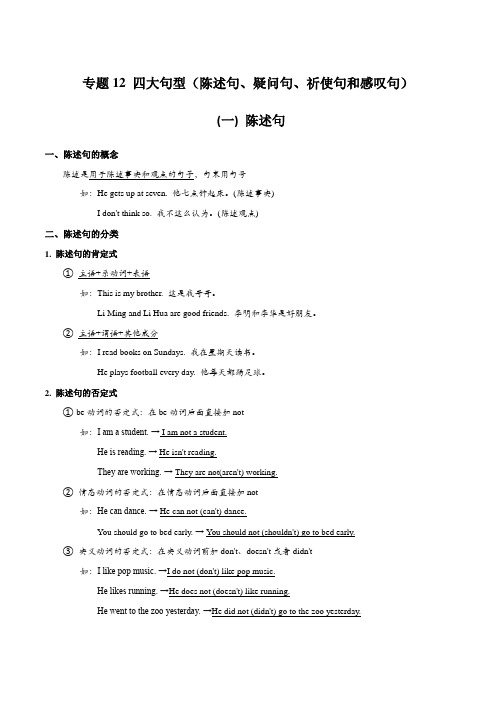
专题12 四大句型(陈述句、疑问句、祈使句和感叹句)(一) 陈述句一、陈述句的概念陈述是用于陈述事实和观点的句子,句末用句号如:He gets up at seven. 他七点钟起床。
(陈述事实)I don't think so. 我不这么认为。
(陈述观点)二、陈述句的分类1. 陈述句的肯定式①主语+系动词+表语如:This is my brother. 这是我哥哥。
Li Ming and Li Hua are good friends. 李明和李华是好朋友。
②主语+谓语+其他成分如:I read books on Sundays. 我在星期天读书。
He plays football every day. 他每天都踢足球。
2. 陈述句的否定式① be动词的否定式:在be动词后面直接加not如:I am a student. → I am not a student.He is reading. → He isn't reading.They are working. → They are not(aren't) working.②情态动词的否定式:在情态动词后面直接加not如:He can dance. → He can not (can't) dance.You should go to bed early. → You should not (shouldn't) go to bed early.③实义动词的否定式:在实义动词前加don't、doesn't或者didn't如:I like pop music. →I do not (don't) like pop music.He likes running. →He does not (doesn't) like running.He went to the zoo yesterday. →He did not (didn't) go to the zoo yesterday.基础闯关(限时10分钟满分10分)一、按要求写句子。
英语句子基本结构成分类型

英语句子基本结构英语句子看上去纷繁庞杂,但仔细观察不外乎五个基本句式;这五个基本句式可以演变出多种复杂的英语句子;换言之,绝大多数英语句子都是由这五个基本句式生成的;这五个基本句式如下:S十V主谓结构S十V十F主系表结构S十V十O主谓宾结构S十V十O1十O2 主谓双宾结构S十V十O十C 主谓宾补结构说明:S=主语;V=谓语;P=表语;O=宾语;O1=间接宾语;O2=直接宾语;C=宾语补足语五个基本句式详细解释如下:1.S十V句式在此句式中,V是不及物动词,又叫自动词vi.;例如:He runs quickly.他跑得快;They listened carefully.他们听得很仔细;He suffered from cold and hunger.他挨冻受饿;China belongs to the third world country.中国属于第三世界国家;The gas has given out.煤气用完了;My ink has run out.我的钢笔水用完了;2.S十V十P句式在此句式中,V是系动词link v.,常见的系动词有:look,seem,appear,sound,feel,taste,smell,grow,get,fall ill/asleep,stand/sit still,become,turn等;例如:He is older than he looks.他比看上去要老;He seen interested in the book.他似乎对这本书感兴趣;The story sounds interesting.这个故事听起来有趣;The desk feels hard.书桌摸起来很硬;The cake tastes nice.饼尝起来很香;The flowers smell sweet and nicc.花闻起来香甜;You have grown taller than before.你长得比以前高了;He has suddenly fallen ill.他突然病倒了;He stood quite still.他静静地站看;He becomes a teacher when he grew up.他长大后当了教师;He could never turn traitor to his country.他永远不会背叛他的祖国;注意:有些动词同时也是及物动词,可构成SVO句式,例如:He looked me up and down.他上下打量我;He reached his hand to feel the elephant.他伸出手来摸象;They are tasting the fish.他们在品尝鱼;They grow rice in their home town.他们在家乡种水稻;He's got a chair to sit on.他有椅子坐;1Please turn the sentence into English.请把这个句于泽成英语;3.S十V十O句式在此句式中,V是及物动词vt.,因此有宾语;例如:I saw a film yesterday.我昨天看了一部电影;Have you read the story 你读过这个故事吗They found their home easily.他们很容易找到他们的家;They built a house last year.他们去年建了一所房子;They've put up a factory in the village.他们在村里建了一座工厂;They have taken good care of the children.这些孩子他们照看得很好;You should look after your children well.你应该好好照看你的孩子;4.S十V十O1十O2句式在此句式中,V是带有双宾语的及物动词;常见的须带双宾语的动词有give,ask,bring,offer,send,pay,lend,show,tell,buy,get;rob,warn等;例如:He gave me a book/a book to me.他给我一本书;He brought me a pen/a pen to me.他带给我一枝钢笔;He offered me his seat/his seat to me.他把座位让给我;注意下边动词改写后介词的变化:Mother bought me a book/a book for me. 妈妈给我买了一本书;He got me a chair/a chair for me.他给我弄了一把椅子;Please do me a favor/a favor for me.请帮我一下;He asked me a question/a question of me.他问我个问题;注意,下边动词只有一种说法:They robbed the old man of his money.他们抢了老人的钱;He's warned me of the danger. 他警告我注意危险;The doctor has cured him of his disease.医生治好了他的病;We must rid the house of th erats.我们必须赶走屋里的老鼠;They deprived him of his right to speak.他们剥夺了他说话的权利;5.S十V十O十C句式在此句式中,V是有宾语补足语的及物动词;常带宾语补足语的词有形容词、副词、介词短语、名词、不定式、现在分词、过去分词常见的可接宾语补足语的动词很多,哪些动词可接哪几种形式作宾补,须根据动词的惯用法而定,不能统而概论;请看下面的例子;They made the girl angry.他们使这个女孩生气了;They found her happy that day.他们发现那天她很高兴;I found him out.我发现他出去了;I saw him in.我见他在家;They saw a foot mark in the sand.他们发现沙地上有脚印;They named the boy Charlie.他们给这个男孩起名为查理;I saw him come in and go out.我见他进来又出去;They felt the car moving fast.他们感到汽车行驶得很快;2I heard the glass broken just now.我刚才听到玻璃碎了;He found the doctor of study closed to him.他发现研究所的大门对他关闭了;经典口语速成第二章基本英语语法一、基本概念音素:英语读音的最小单位;音节:英语读音的基本单位;单词:表达思想的最小单位;句子:表达思想的基本单位,含有主语和谓语动词,有比较完整意义的一组词;英语语法包括词法和句法:词法:主要是说明各种词的形成,变化及用法的规律;句法:主要是说明句子的各个组成部分及结构的规律;句子成份:组成英语句子的成份有七种:主语,谓语,宾语,表语,定语,状语和补语;从句:含有主语和谓语,但不能构成一个独立句子的一组词;从句构成句子的一个成份,如:主语从句,表语从句,宾语从句,同位语从句,定语从句和状语从句;短语:具有一定的意义,但构不成句子或从句的一组词;只能构成句子成份,如:不定式短语,动名词短语,分词短语,介词短语等;词序:是指词或句子成份在句子中按照一定规律和要求排列的顺序;二、十大词类词类是学好英语的一个关键,每学一个词都必须知道它是属于哪个词类;英语中的词可以根据词义,句法作用和形式特征分为十大词类;名词Nounsn.:表示人或事物的名称;名词分为可数名词如:pen 钢笔te a'cher 老师,不可数名词如:i`dea' 主意,fire 火,air 空气;可数名词的复数要在名词后加s;名词的所有格:表示有生命的东西和表示时间、距离等名称的名词可以加's来表示所有关系,以s结尾复数名词只加',带这种词尾的名词称为该名词的所有格;注音英语用“'”表示重读符号,用“"”表示名词的所有格;如my broth'er"s book 我弟弟的书,the stu'dents" chairs 学生们的椅子;形容词Adj'ectivesa.:表示人或事物的特征,如:bad, b ea u'tiful`副词Ad'verb`sadv.:修饰动词,形容词或其它副词,如:ve'ry, quick'ly动词Verbs:vi. vt.:表示动作或状态如:stud'y, be代词Pro'noun`spron.:代替名词,数词等,如:they, one数词Nu'meralsnum.:表示数量或顺序,如:five, tenth冠词Ar'ticlesart.:限制名词的意义,只有3个:不定冠词a, an在元音开头的名词前,主要用来表示不肯定的“某一个或任何一个”,一般与单数可数名词联用;定冠词the, the 在元音开头的名词前,主要用来表示指定的人或事物,以区别同类中其他的人或事物;相当于汉语中的“那个,那些,这个这些”;它既可以和单数名词,复数名词连用,又可以和不可数名词连用;3介词Prep`osit'ionsprep.:表示名词,代词和其它词的关系,如:in, for, of连词Conjunc'tionconj.:连结词与词或句与句,如:and, becau'se感叹词Interjec'tioninterj.:表示说话时的感情或口气,如:oh, hey以上十类词中,前六类即名词,形容词,副词,动词,代词和数词都有实义,在句子中能独立担任一定的句子成份,称为实词;后四种即冠词,介词,联词和感叹词没有实义,都不能在句中独立担任任何成份,称为虚词;有的词可以属于几个词类,往往要在词组或句子中才能鉴别;如:My room is bri gh t and cle a n.a. 我的房间又明亮又清洁;I cle a n my room ev'e ry da y.v. 我每天打扫房间;三、句子成分组成句子的各个部分叫句子成分;英语句子成分有主语,谓语,表语,宾语,宾语补足语,定语,状语等;1、主语主语表示句子主要说明的人或事物,一般由名词,代词,数词,不定式等充当;He likes watch'ing TV. 他喜欢看电视;2、谓语谓语说明主语的动作,状态或特征;一般可分为两类:1 简单谓语由动词或短语动词构成;可以有不同的时态,语态和语气;We stud'y for the pe o'ple. 我们为人民学习;2 复合谓语:情态动词+不定式I can spe a k a lit'tle Eng'lish. 我可以说一点英语;3、表语表语是谓语的一部分,它位于系动词如be之后,说明主语身份,特征,属性或状态;一般由名词,代词,形容词,副词,不定式,介词短语等充当;My sis'ter is a nurse. 我姐姐是护士;4、宾语宾语表示动作行为的对象,跟在及物动词之后,能作宾语的有名词,代词,数词,动词不定式等;We like Eng'lish. 我们喜欢英语;有些及物动词可以带两个宾语,往往一个指人,一个指物,指人的叫间接宾语,指物的叫直接宾语;He gave me som'e ink. 他给了我一点墨水;有些及物动词的宾语后面还需要有一个补足语,意思才完整,宾语和它的补足语构成复合宾语;如:We make him our mon'itor. 我们选他当班长;5、定语在句中修饰名词或代词的成分叫定语;用作定语的主要是形容词,代词,数词,名词,副词,动词不定式,介词短语等;形容词,代词,数词,名词等作定语时,通常放在被修饰的词前面;He is a n e w stu'dent. 他是个新生;但副词,动词不定式,介词短语等作定语时,则放在被修饰的词之后;The bike in the room is mine. 房间里的自行车是我的;6、状语4修饰动词,形容词,副词以及全句的句子成分,叫做状语;用作状语的通常是副词,介词短语,不定式和从句等;状语一般放在被修饰的词之后或放在句尾;副词作状语时可放在被修饰的词前或句首;He lives in Lon'don. 他住在伦敦;四、句子种类1、陈述句陈述句用来叙述一个事实或表示说话人的看法,句末用句号,朗读时通常用降调;We ar e stud'ying French. 我们在学习法语;把陈述句的肯定式变为否定式,主要有以下几种方式:1 如果句子中的谓语动词是be,hav'e,或者谓语部分中含有助动词be, hav'e, do, shall, will等,情态动词can 能,ma y可以,must 必须等时,在它们后面加not 构成否定结构;That is not his bike. 那不是他的自行车;I hav'e not an'y pic'ture-books. 我没有图画书;They can not be here so e a r'ly. 他们不可能那么早到这儿;We will not go to the farm next Sat'urd a y. 下星期六我们不去农场;在某种情况下,可把no放在名词的前面构成否定式;He has no broth'ers.=He has not an'y broth'ers.他没有兄弟;2 如果句子里的谓语动词不是be 或hav'e,也没有助动词和情态动词,那就要在动词之前加上do not第三人称单数现在时态用do e s' not,过去式用did not构成否定形式;He do e s'n"t like da'ncing. 他不喜欢跳舞;We do'n"t k no w Ru s si'an. 我们不懂俄语;2、疑问句疑问句用来提出问题或疑问,疑问句句尾要用问号;疑问句又可分为:一般疑问句,特殊疑问句,选择疑问句和反意问句;1 一般疑问句以一个助动词,情态动词,动词be或hav'e开始,通常要求用yes或no回答的疑问句叫一般疑问句;朗读时通常用升调;Ar e yo u a mid'dle sc h ool stu'dent 你是中学生吗Do they pla y ba'sketball` in the a'fternoon` 他们下午打篮球吗Can yo u repair' the bike yo u r`self' 你自己能修理这部自行车吗2 特殊疑问句用疑问代词或疑问副词引导的疑问句叫特殊疑问句;朗读时通常用降调;常见的疑问代词有:w ho 谁,w ho'm 谁宾格,w hose 谁的,w h ich 哪一个,w h at 什么;疑问副词有w h en 什么时候,w h ere 什么地方,w h y 为什么,how 如何;特殊疑问句不能用yes或no回答;特殊疑问句通常有两种结构:疑问代词或副词位于句首用作主语或作修饰主语的定语,用陈述句的语序;W ho is sweeping the fl o or 谁在打扫地板W h ich bike is yo u rs 哪辆自行车是你的W h at is on the ta'ble 桌子上是什么疑问代词或疑问副词+一般疑问句的语序;W h at is yo u r moth'er 你母亲是干什么的W ho ar e these girls 这些女孩是谁W hom ar e yo u wa i'ting for 你们在等谁5W h at do yo u do on Sun'd a y 星期天你干什么W h ere do e s' yo u r grand'pa` liv'e 你爷爷住在哪里How did yo u com'e back 你最喜欢哪一个3 选择问句提出两种或两种以上的不同情况,由对方加以选择作出回答的疑问句称为选择疑问句;选择问句的结构是:“一般疑问句+or+一般疑问句”后一句常用省略结构,省去意义上与前句相同的部分,前一问句用升调,后一问句用降调;回答时,句首不用yes 或no,一般根据情况从两个并列的选择成份选出其中一种来回答;Is Kate"s hair long or short 凯特的头发是长的还是短的Shall we go there on Mon'd a y or on Tues'd a y 我们是星期一还是星期二去那里4 反意问句在陈述句之后附上一个简短问句,对陈述句所述的事实提出相反的疑问,这种疑问句叫反意疑问句,如果前一部分是肯定式,后一部分一般用否定式;如果前一部分是否定式,后一部分一般用肯定式;前后两部分在人称,数及时态上通常保持一致;朗读时前一部分用降调,后一部分在表示疑问时用升调,在表示强调等意思时用降调;Yo u r fa'ther is a wor'ker, is'n"t he你父亲是工人,是吗They did'n"t fi'nd an'y living things there, did they他们在那儿没有发现任何有生命的东西,是吗回答问题时,和一般疑问句结构一样,如果答语是肯定的,就用“Yes+肯定结构”,如果答语是否定的,就用“No+否定结构”,绝不可与汉语习惯相混;He do e s'n"t enjoy' singing, do e s' he Yes, he do e s'.No,he do e s'n"t.他不喜欢唱歌,是吗不,他喜欢;是的,他不喜欢;3、祈使句祈使句是用来表示命令,请求或建议等意义的句子;祈使句的主语yo u通常省略,谓语动词用原形,句末用惊叹号,朗读时一般用降调;Com'e here, ple a se. 请来这里;Ple a se o'pen the win'dow. 请打开窗子;4、感叹句感叹句是表示喜怒哀乐等强烈感情的句子,句末用惊叹号,朗读时用降调;感叹句往往由w h at或how 引导;w h at用作定语修饰名词,how用作状语修饰形容词,副词或动词;W h at a good com'rade she is 她是一位多么好的同志啊How hard all these pe o'ple ar e wor'king 所有这些人干得多起劲啊以上两种感叹句在口头上常采用简略式;How nice 多好啊W h at a fine da y多好的天气五、二十二种常见的特殊疑问句:1、对职业提问,用W h atW h at is yo u r moth'er My moth'er is a te a'cher.你妈妈是干什么的我妈妈是教师;2、对具体日期提问,用W h a t…the date…W h at is the date toda y' It"s the sec'ond of March.今天几号今天是三月二号;3、对星期几提问,用W h at da y6W h at da y is toda y' It"s Mon'd a y.今天星期几今天星期一;4、问为什么用W h a t…for 相当W h yW h at did yo u do that for I want'ed to make a kite.你为什么做那些我想做个风筝;5、问人和事物的性质或持久的特性,用W h at is …likeW h at is his broth'er like His broth'er is a ve'ry nice per'son.他兄弟怎么样他兄弟是很好的人;6、问人和事物的性质或持久的特性用How 或W h at is … likeHow do e s' the girl look The girl looks b ea u'tiful`.这姑娘长得怎么样这姑娘长得很漂亮;7、对颜色提问用W h at col'o urW h at col'o ur is yo u r co a t My co a t is green.你的大衣是什么颜色我的大衣是绿色;8、问候别人的健康状况时,用HowHow is yo u r moth'er My moth'er is ve'ry well.你妈妈的身体怎么样我妈妈的身体很好;9、对方式提问,用HowHow do e s' yo u r fa'ther go to work He goes to work by bike.你父亲怎样去上班他骑自行车上班;10、问可数名词的数量用How man'y +可数名词复数How man'y pe o'ple ar e there in yo u r fam'ily There ar e fo u r pe o'ple in my fam'ily 你家有多少人我家有四口人;11、问不不可数名词的量用How much +不可数名词How much mon'ey has he made He has made a gr e at de a l of mon'ey.他挣了多少钱他挣了很多钱;12、对重量提问用How muchHow much do e s' she weigh She weighs 125 pounds.她有多重她重一百二十五磅;13、对金钱提问用How muchHow much did yo u spend on this dic'tionary I spent nine yuan on this dic'tionary. 你这本字典花了多少钱这本字典我花了9元;14、对一段时间提问用How longHow long hav'e yo u liv'ed here We hav'e liv'ed here for five years.你们住在这多长时间了我们住在这五年了;15、对频率提问用How of'te nHow of't en do e s' he w rite home He w rites home once a month.他多长时间给家里写信他一个月给家里写一封信;16、问多长时间之后某事会发生,用How soon 或W h enHow soon W h en will he be back He will be back in an h our.他什么时候回来他将在一小时内回来;17、问路程多远用How farHow far is it from here to yo u r sc h ool It is ha'l f an h our"s walk from here to our sc h ool. 从这里到你们学校有多远从这里到我们学校步行要半小时;718、对谁提问用W hoW ho is the wo'man The wo'man is my te a'cher.这个女人是谁这个女人是我的老师;19、对谁的提问用W hoseW hose book is this This is my book.这是谁的书这是我的书;20、对原因提问用W h yW h y did he com'e late He com'e late becau'se he was ill.为什么他来迟了他来迟是因为他病了;21、对时间状语提问用W h enW h en do e s' he of'te n watch TV He of'te n watches TV at sev'en in the eve'ning. 他经常什么时候看电视他经常晚上7点钟看电视;22、对地点状语提问用W h ereW h ere did he go la'st Sun'd a y He went to the zoo la'st Sun'd a y.上星期天他去那了上星期天他去动物园了;六、基本句型一简单句;由一个主语或并列主语和一个谓语或并列谓语构成的句子叫做简单句;简单句有六个基本句型:1、主语+不及物动词Rose is w ri'ting. 罗斯在写字;I liv'e in Shanghai. 我住在上海;不及物动词后常跟有状语性质的修饰语,这种修饰语可由副词,介词短语,不定式短语等来担任;2、主语+连系动词+表语We ar e Le a g ue mem'bers. 我们是共青团员;3、主语+及物动词+宾语I hav'e a TV set. 我有一台电视机;He te a ches Eng'lish in the mid'dle sc h ool. 他在中学教英语;4、主语+及物动词+间接宾语+直接宾语He to'ld me his name. 他把他的名字告诉我;Her moth'er bought her a n e w dress. 她母亲给她买了一件新衣服;5、主语+及物动词+宾语+宾语补足语We must make our coun'try rich and strong. 我们要使我们国家富强起来;The chil'dren cal'led him Un'cle Li. 孩子们叫他李大伯;6、there+be 结构英语中there+be 结构表示“某处或时间有某人或某物”的意思;there 是引导词,本身无词义,be 为谓语动词,它后面的名词用作主语,两者必须取得数的一致,句子最后是地点时间状语;There is a dog in front of the house. 房前有只狗;There ar e som'e chicks un'der the tree. 树下有几只小鸡;二并列句:由并列连词把两个或两个以上的简单句连在一起而构成的句子叫并列句,其基本句型是:简单句+并列连词+简单句;I help him and he helps me. 我帮助他,他帮助我;We must set out ri gh t now, or we"ll be late. 我们必须马上出发,否则我们就会迟8到;三,复合句:复合句包含两个以上的主谓结构,其中一个主谓结构是句子的主体,称为主句;另一个或几个主谓结构不能独立存在,只能作为句子的一个成份,称为从句,如宾语从句,状语从句等;She said that she missed us ve'ry much. 她说她非常想念我们;宾语从句Can yo u tell me w h ere the bus-stop is 请告诉我公共汽车站在哪儿,好吗宾语从句It was ra i'ning w h en I went to sc h ool yes'terd a y. 昨天我上学的时候,天正在下雨;时间状语从句We could not drink the milk becau'se it was too hot. 牛奶太烫喝不下去;原因状语从句If yo u want to be a col'lege stu'dent, yo u must stud'y har'der. 如果你想成为大学生,你必须更加努力学习;条件状语从句He ran so fa'st that I couldn"t keep up with him.他跑得很快,我赶不上他;结果状语从句He spoke in a loud enough' voice so that ev'e rybod`y mi gh t hear.他大声地说话,以便每个人都能听见;目的状语从句This text is as instruc'tive as that one.这篇课文和那篇一样具有教育意义;比较状语从句A truck goes faster than a bike.卡车比自行车跑得快;比较状语从句than 引导的比较状语从句常常省去与主句中相同的部分,只留下不相同的部分;七、动词的种类表示动作或状态的词叫动词,句子中的主要作用是充当谓语;根据动词的词义和在句子中的作用可分为以下四类;1、行为动词:行为动词具有完全的词义,在句子中能单独用作谓语;如:like 喜欢, stud'y 学习, com'e 来;2、联系动词:联系动词本身虽有一定的词义,但不完整,不能单独作谓语,必须和作表语的词语如形容词,名词等连用;如:be 是, seem 似乎, becom'e 成为,变得;3、助动词:助动词本身没有词义,不能独立做谓语;用来表示否定,疑问,时态及其它语法关系;助动词必须和主语保持人称,数的一致;常用的助动词有:be,hav'e,do,shall,will等;4、情态动词:情态动词本身有一定的意义,但不能独立作谓语,只能和主要动词一起构成谓语动词,表示说话人的语气和情态,情态动词没有人称和数的变化;常用情态动词有:can 能, ma y可以, must 必须, hav'e to 不得不, shall 好吗, will 好吗,would,好吗;八、动词的时态动词时态是动词的一种形式,表示动作或状态发生或存在的时间时和方式态;基本语法主要学习五种时态;91 表示习惯或经常反复发生的动作或存在的状态,动词常与al'wa y`s 总是,of'te n 经常, som'e time` 有时, ev'e ry da y每天等时间状语连用;We som'e time`s swim in the riv'er. 我们有时在河里游泳;2 表示主语通常具有的特征,性格,能力等;Alice likes draw'ing. 爱丽斯喜欢画画;3 表示客观真理和科学事实;Sum'mer com'es a'fter spring. 春去夏来;4 用在童话,寓言等描述中;The cock smile's and goes to sleep hi gh up in the street. 公鸡笑了,飞到高高的树上睡觉去了;2、一般过去时的用法1 表示过去某个或某段时间发生的动作或存在的状态,常与yes'terd a y 昨天,la'st year 去年,in 1949 在1949年,t w o years ago' 两年前,before' lib`era'tion 解放前等表示过去时间的状语连用;I was born on A'pril 2,1969. 我出生于一九六九年四月二日;2 表示过去一段时间内经常或反复发生的行为,虽然与every da y每天,som'e time` 等时间状语连用,也要用过去式;We of't en went to swim in the riv'er la'st sum'mer. 去年夏天我们经常去游泳;3、一般将来时的用法1 表示将要发生的动作或存在的状态,常与表示将来的时间状语连用;如:next week 下一星期,tomor'row 明天,this eve'ning 今天晚上,in a month 这个月,ve'ry soon 很快等;I will go swim'ming this a'fternoon`. 今天下午我将去游泳;2 表示将来经常发生的动作;From now on I will com'e for the news'pa`per ev'e ry Mon'd a y. 从现在起我将每星期一来取报纸;3 be going to +动词原形的用法表示计划或打算要做某件事情;We ar e going to hav'e a vol'leyball` match tomor'row. 明天我们将举行排球比赛;有时候也可以表示遥远的将来,特别是带有明确的时间状语和从句时;W h at ar e yo u going to be w h en yo u grow up. 你长大后打算做什么表示根据目前迹象某件事情非常有可能发生;Look at those clouds It"s going to ra i n. 瞧瞧那些云吧,快下雨了;4、现在进行时的用法1 表示说话时正在进行的动作We ar e re a'ding the text. 我们正在读课文;2 表示现阶段正在发生的动作We ar e wor'king in a fac'tory these da y s. 我们目前在一家工厂里劳动;3 有些表示“来”、“去”等动作的动词,它的现在进行时可以表示将来发生的行为;如:com'e 来,go 去,leave 留下,start 开始,arrive' 达到,sta y停留等;The bus is com'ing to the next stop. 公共汽车快要到下一站了;5、现在完成时的用法1 表示动作已完成,但影响还存在,常被just 刚刚,al`re a d'y 已经,yet 还等副词修饰;10We hav'e just seen the film. 我们刚看过这部电影;2 表示过去发生的动作一直延续到现在,常常带有for或since 表示一段时间的状语;He has le a r'ned Eng'lish for about' t w o years. 他学英语已经大约两年了;3 表示说话前发生过一次或多次的动作,现在已完成为一种经验,汉语用“过”来表示,常带有twice 两次,ev'er 曾经,nev'er 从不等时间状语;They hav'e been to the Gr e a't Wall twice. 他们去过两次长城;九、动词的语态英语动词有两种语态:主动语态和被动语态;主动语态表示主语是动作的执行者,被动语态表示主语是动作的承受者;We of'te n use a recor'der in our Eng'lish cla'ss. 主动语态我们经常在英语课上使用录音机;A recor'der is of'te n used in our Eng'lish cla'ss. 被动语态英语课上常使用录音机;被动语态的构成和形式被动语态由“助动词be+及物动词的过去分词”构成;助动词be必须与主语的人称和数一致,并且有各种时态变化;被动语态的否定式:由助动词如果不止一个,则第二个助动词前加not 构成;疑问式:将助动词如果不止一个,则第一个助动词提到主语的前面;Bi'cycles ar e so'ld in that shop. 肯定:那家商店出售自行车;Bi'cycles ar e not so'ld in that shop. 否定:那家商店不卖自行车;Ar e bi'cycles so'ld in that shop 疑问:那家商店出售自行车吗十、动词不定式动词不定式是动词的一种非谓语形式,由“t o+动词原形”构成,有时to可以省略;动词不定式没有人称和数的变化,在句中不能作谓语,它既具有动词的一些特征,又具有名词,形容词和副词的功能;1、动词不定式的用法1 作主语To le a rn Eng'lish well is not e a'sy. 学好英语不容易;动词不定式作主语时,常常用it 作形式主语,放在句子的开头,把动词不定式放在谓语后面,但翻译时不必把it 译出来;It's bad man'ners to spit in pub'lic.在公共场合吐痰是不礼貌的;2 作表语His work is to te a ch Eng'lish.他的工作是教英语;3 作宾语I want to a'sk him a ques'tion.我想问他一个问题;4 作宾语补足语The te a'cher to'ld us to do Ex'ercise`s 1 and 2.老师叫我们做练习一和二;5 作定语They hav'e no house to liv'e in.他们无房子可住;注意:动词不定式作定语时,必须放在被修饰的名词或代词之后;6 作状语I 'm glad to meet yo u.见到你很高兴;十一、形容词的比较级和最高级的用法。
正式英语的四种基本疑问句式

正式英语的四种基本疑问句式:1.May I: 自己要做什么事时May I have your name, please?May I have your check-out time, please?May I have your passport, please?May I know your room number, please?2.Could you: 麻烦客人时Could you fill out the form, please?Could you write that down, please?Could you hold the line, please?Could you wait just a moment, please?3.Would you: 询问客人的喜好或是需要做什么时Would you like to take a taxi?Would you mind wait just a moment?Who would you like to contact?What time would you like to check-out?Where would you like to go?When would you like to go to the airport?Which kind of room would you prefer?How would you like to settle your bill?How long would you like to stay?How many stamps would you like to buy?4.Shall I: 提供建议、协助、征求意见时Shall I make the reservation for you? Shall I draw you a map?Shall I booking the room for you?Shall I book a taxi for you?。
英语倒装句的四种基本句型例句

英语倒装句的四种基本句型例句嗨,小伙伴们!今天咱们来好好唠唠英语倒装句的四种基本句型,这可真是英语学习里超有趣的一部分呢。
就像一场奇妙的语言魔术,让句子变得超级有特色。
**一、完全倒装(Full Inversion)**完全倒装就是把整个谓语动词都放到主语之前啦。
这就好比是把一场演出的主角(主语)和配角(谓语)的出场顺序完全颠倒了一下,给人一种很新奇的感觉。
例句1:There goes the bell.(铃响了。
)你看,正常的语序应该是The bell goes there. 但是这样一倒装,就有一种突然性,就像你正等着什么事情发生,然后“铃就响了”,这种表达更加生动。
我还记得我刚学这个的时候,我同学问我:“为啥要这么说呀?直接说The bell goes there不就得了?”我就跟他说:“哎呀,这就像你去看魔术表演,魔术师要是按平常的方式出牌,那还有啥惊喜呢?这种倒装句就像魔术里的大变活人,突然把主语和谓语的位置变了,让句子变得超酷。
”例句2:Here comes the bus.(公共汽车来了。
)想象一下,你在车站等车等得心急火燎的,然后你大喊一声“Here comes the bus”,是不是感觉比“The bus comes here”更带感呢?这时候句子就像是一个充满活力的小助手,快速地把重要的信息“bus来了”传达给你。
例句3:Away flew the birds.(鸟儿飞走了。
)这个句子要是正常说就是The birds flew away. 可一旦倒装,就像是我们在描述一个很突然的画面,鸟儿“嗖”的一下就飞走了,那种动态感更强了。
我跟我的英语老师讨论这个句子的时候,老师说:“你看,这种倒装就像是给句子加了个加速器,让动作更迅速地呈现在读者或者听者的脑海里。
”我当时就觉得,哇塞,真的是这样呢!**二、部分倒装(Partial Inversion)**部分倒装呢,就是只把助动词、情态动词或者be动词放到主语前面,主要动词还在主语后面呢。
英语五大基本句型结构介绍
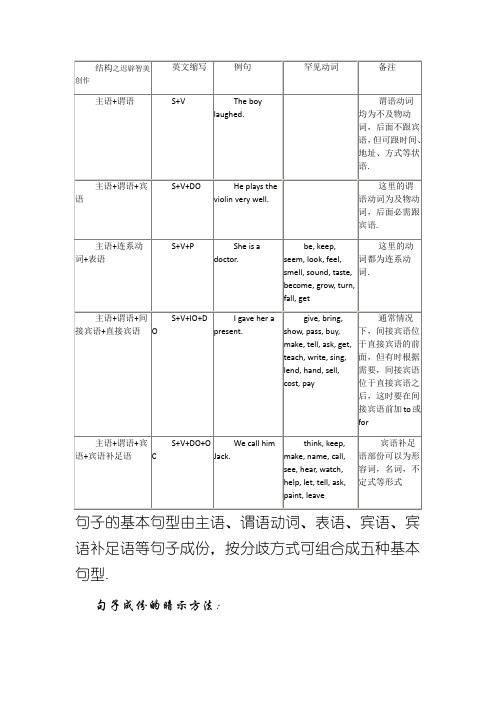
句子的基本句型由主语、谓语动词、表语、宾语、宾语补足语等句子成份,按分歧方式可组合成五种基本句型.句子成份的暗示方法:S: Subject主语;V: Verb动词;O: Object宾语;P: Predicative表语;IO: Indirect Object间接宾语;DO:Direct Object 直接宾语OC: Object Complement宾语补足语;◇第一种句型:主语+不及物动词(S+V)该句型所用动词都是不及物动词,其后固然不能接宾语,可是可以用状语修饰谓语动词或整个句子.He runs fast in the street.他在街上跑得飞快.The meeting begins at nine.会议九点开始.◇第二种句型:主语+及物动词+宾语(S+V+DO)该句型所用动词都是及物动词,可作宾语的有名词、代词、不定式、动名词或短语及从句.We attended the meeting.我们列席了那次会议.(名词作宾语) She stopped him.她叫住了他.(代词作宾语)She wants to ask a question.她要问一个问题.(不定式作宾语) They enjoy listening to the classic music.他们喜欢听古典音乐.(动名词作宾语)注意:一些不及物动词之后加上介词就可以具有及物动词的功能,其后就可以接宾语了.这一类词组有:listen to 听;look at 看;look after 照看;look for 寻找;arrive at/in 达到等.May I turn on the light?我可以开灯吗?What are you looking for?你在找什么?◇第三种句型:主语+连系动词+表语(S+V+P)连系动词的后面必需接表语,说明主语的情况和状态.通常可作表语的是名词或形容词.She became a lawyer last year. 去年,她成了一名律师.He is honest.他是诚笃的.It is getting colder and colder.天气渐渐冷了.It tastes delicious.这好吃极了.下列动词也作连系动词使用:look 看起来;smell 闻起来;sound 听起来;taste 尝起来;feel 感觉;keep 坚持;grow/go/get/turn变得.◇第四种句型:主语+及物动词+间接宾语+直接宾语(S+V+IO+DO)(1)宾语分直接宾语和间接宾语.直接宾语是及物动词的直接对象,但某些动词,除直接宾语外,还要求一个间接宾语,以暗示该动词所暗示的举措所及的人或物,通常由名词或代词的宾格担负.She gave me a ticket for that film.她给了我一张那部片子的票.Please pass me the salt.请把盐递给我(2)通常情况下,间接宾语位于直接宾语的前面,但有时根据强调需要,间接宾语位于直接宾语之后,这时要在间接宾语前加to或for.I will bring the book(宾,直接) to you next time. (宾,间接)(=I will bring you the book next time.)我下次把那本书给你带来. He promised a motorbike (宾,直接) to her. (宾,间接)(=He promised her a motorbike.)他承诺给她买一辆摩托车. Mother bought a new bag (宾,直宾) for him.(宾,间宾)(=Mother bought him a new bag.)妈妈给他买了一个新书包. She sang several songs (宾,直宾) for them. (宾,间宾)(=She sang them several songs.)她为他们唱了几首歌.Please pass (谓)the salt (宾,直接)to me. (宾,间接)请把盐递给我.注意:带特殊疑问词的不定式短语作直接宾语是一种很经常使用的形式,基本句型是:S+V+DO+疑问词+不定式主语+及物动词+间接宾语+疑问词+不定式She told me how to understand the article.她告诉我怎样理解这篇文章.They wanted to know where to solve the problem.他们想要知道哪里能够解决这个问题.The boy asked her why to do so.那孩子问她为什么这么做.I asked him which one to choose.我问他选择哪一个.◇第五种句型:主语+及物动词+宾语+宾语补足语(S+V+DO+OC)(1)有些及物动词,只接一个宾语不能表达完整的意思,还需要再加一个宾语的补语加以说明,使意思完整.这样的宾语和宾语补足语又称为复合宾语,可以由名词、形容词和不定式来担负.They named the girl Susan.他们给这个女孩起名叫苏姗.(名词作宾补)He found her frustrated.他觉得她有些沮丧.(形容词作宾补) I saw them perform on the stage.我看见他们在台上饰演.(不定式作宾补)(2)一些使役性动词如make, let, have和一些暗示感官的动词如see, watch, look at, hear, listen to, feel等,用不定式作宾语补语时,要省去“to”.We all made him play the violin.我们都要求他演奏小提琴.I saw him enter the room.我看见他进屋了.He heard a woman cry over there under a tree.他听见一个女人在那边一棵树下哭.必背:记住下面是一些经常使用的要求复合宾语的动词:elect (选举), name, call, make, find, think, leave.We'll make him monitor.我们要选他当班长.She found the boy very funny.她觉得这个孩子非常滑稽.He left the door open and hid behind the door.他让门开着,然后藏在门后边.比力:双宾语句型与复合宾语句型的区别它们之间最主要的区别是:复合宾语中的宾语和它的补足语有着逻辑上的主谓关系,但双宾语则没有这种逻辑上的主谓关系.例如:We call him (宾) Jack.(宾补)我们叫他杰克.(这里宾语him和宾语补足语Jack具有逻辑上的主谓关系,即“他就是杰克” ,这样Jack就是宾语补语)He bought her (直宾) a bike.(间宾)他给她买了一辆自行车.(宾语her和后面的词a bike不能形成逻辑上的主谓关系,不能想像“她是车”,因此,该句为双宾语句型.。
英语句子基本结构成分类型
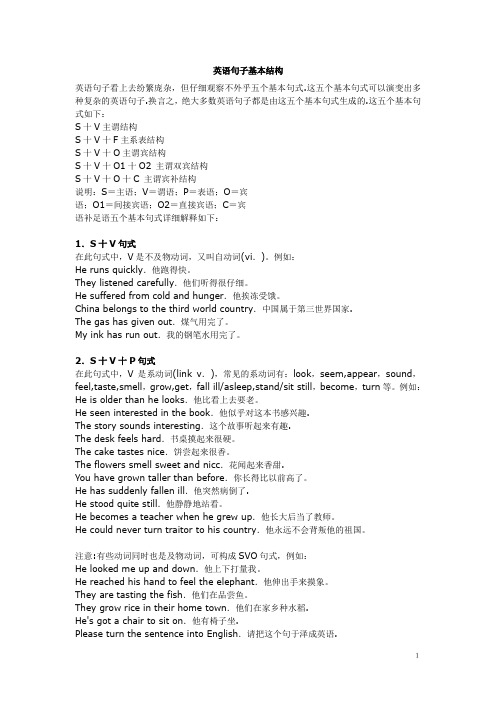
英语句子基本结构英语句子看上去纷繁庞杂,但仔细观察不外乎五个基本句式.这五个基本句式可以演变出多种复杂的英语句子.换言之,绝大多数英语句子都是由这五个基本句式生成的.这五个基本句式如下:S十V主谓结构S十V十F主系表结构S十V十O主谓宾结构S十V十O1十O2 主谓双宾结构S十V十O十C 主谓宾补结构说明:S=主语;V=谓语;P=表语;O=宾语;O1=间接宾语;O2=直接宾语;C=宾语补足语五个基本句式详细解释如下:1.S十V句式在此句式中,V是不及物动词,又叫自动词(vi.)。
例如:He runs quickly.他跑得快。
They listened carefully.他们听得很仔细。
He suffered from cold and hunger.他挨冻受饿。
China belongs to the third world country.中国属于第三世界国家.The gas has given out.煤气用完了。
My ink has run out.我的钢笔水用完了。
2.S十V十P句式在此句式中,V是系动词(link v.),常见的系动词有:look,seem,appear,sound,feel,taste,smell,grow,get,fall ill/asleep,stand/sit still,become,turn等。
例如:He is older than he looks.他比看上去要老。
He seen interested in the book.他似乎对这本书感兴趣.The story sounds interesting.这个故事听起来有趣.The desk feels hard.书桌摸起来很硬。
The cake tastes nice.饼尝起来很香。
The flowers smell sweet and nicc.花闻起来香甜.You have grown taller than before.你长得比以前高了。
- 1、下载文档前请自行甄别文档内容的完整性,平台不提供额外的编辑、内容补充、找答案等附加服务。
- 2、"仅部分预览"的文档,不可在线预览部分如存在完整性等问题,可反馈申请退款(可完整预览的文档不适用该条件!)。
- 3、如文档侵犯您的权益,请联系客服反馈,我们会尽快为您处理(人工客服工作时间:9:00-18:30)。
英语四种基本句式:陈述、疑问、祈使和感叹句He goes to school.I am not a boy. He does not go to school.Are you a student? Do you / Does she like English ?What time (is it),please ? which is your pen?what date is it today? 问日期This is a book. Is this a book? __ yes, it is / no, it isn’tWhat is this ? what this is ?I like English. I do not like English. Do you like English? What do you like?She does not like English. Does she like English. What does she like ?When 问时间who 问人whose 问主人where问地点which 问选择why问原因what time问时间what color 问颜色what about 问意见what day问星期what date问日期what place 问具体地点How 问情况how old 问年龄how many/much问数量、价钱how about问意见how far 问路程how often 问频率1.some变为any。
如:There are some birds in the tree. →There aren't any birds in the tree.但是,若在表示邀请、请求的句子中,some可以不变。
如:Would you like some orange juice?与此相关的一些不定代词如something, somebody等也要进行相应变化。
2.and变为or。
如:I have a knife and a ruler. →I don't have a knife or a ruler.You needn’t worry about the job and pay._ You needn’t worry about the job or pay. (Don’t need to) 3.a lot of (=lots of)变为many(修饰可数n)或much(修饰不可数n)。
如:They have a lot of friends.(可数名词)→They don't have many friends.There is lots of orange in the bottle.(不可数名词)→There isn't much orange in the bottle.4.already变为yet。
如:I have been there already. →I haven't been there yet.I have sent you the mail already. →I haven’t sent you the mail yet.二:疑问句questios分类:一般疑问、特殊疑问、反意疑问、选择疑问型,一般可由yes/no来回答;A . be/助/情态动词(be can do have will 等)+主语+谓语/表语+(其他),句子要读升调;Eg:Are they your friends? Can you play basketball?Can you swim to the other side?Does he go to school on foot? Do you like English?Have you locked the door? Will you be free tonight?以上均可用yes、no来回答。
B: 陈述句亦可用作一般疑问句,多用在非正式文体中,句末有问号,用升调;Eg:Somebody is with you?He didn’t finish the work? You are fresh from America,I suppose?22.一般疑问句的回答:除yes、no外,也可用certainly,probably,perhaps,of course,all right,with pleasure等代替yes,用never,not at all等代替no;Eg:—Can you help me?—Certainly.—Could you please make less noise?—All right,sir.—Have you been there?—Never.33.一般疑问句的否定式:A. 一般结构:系/助/情态动词+not+主语;也可为:系/助/情态动词+主语+not。
Eg:Do you not/Don’t you believe me? Is it not / Isn’t it a lovely day?Are you not / Aren’t you coming? Will you not /Won’t you sit down?Is he not / Isn’t he a doctor? Wil l he not /Won’t he go with you?Does Helen not /Doesn’t Helen like chocolate? 海伦不喜欢巧克力吗?B.否定疑问句并不单纯表示提问,它常常带有感情色彩; 否定疑问句的完全式比简略式所表达的语气更强烈些; 惊异、赞叹或责难等语气; 暗示提问者期待着肯定的回答; 表示邀请或建议;Eg:Haven’t you read the newspaper?Won’t he come?他不来了啊?Shouldn’t we start now?Wasn’t it an interesting film?“不”,no的含义为“是”,但在回答这类句子时,应该注意yes后接肯定结构,no后接否定结构,这和汉语习惯不同。
Eg:—Are you not Mr Smith?—Yes,I am.不,我是// —No,I am not.是的,我不是—Haven’t you read this book before?—Yes,I have.不,我读过//—No,I haven’t.是的,我没有—Don’t you play chess?—Yes ,I do.不,我下棋//—No,I don’t.是的,我不下棋。
教你一招:在这样的答语中,只要根据实际情况来判断,如果事实上是,就用肯定的结构,前面接yes;如果事实上不是,就用否定结构,前面接no;但此时的yes、no应翻译成反义的中文。
:wh-questions型问句,when. where. what. who. why. which. whose.A . 特殊疑问词+一般疑问句;即特殊疑问词+be/助/情态动词+主语+谓语/表语+(其他).Eg: Who is it on the phone?谁来的电话?How many oranges can you see in the picture?Where did you last see it?What did you eat yesterday?How do you usually go to school?What can be done about it?Which are yours?What did you say?Who would like to come for a game of football?Why didn’t you tell me?B: 特殊疑问句有时可有一个以上的疑问词;Eg: Which present did you give to whom?When and where did you meet?C: 特殊疑问句有时须以介词开首;Eg:By whom is the book written?Since when have you lived here?D: 疑问词作主语或主语的定语时,与陈述句的语序相同;Eg: Who is in the room?谁在房间里?E: “why+一般疑问句否定式”这种结构一般表示劲告、建议、责备等,而不能归为特殊问句;Eg: Why don’t you come earlier?Why not go skiing?为何不去滑雪呢?22.特殊疑问词:疑问代词、疑问副词A. 疑问代词:who whom whose which what指认S 指人O 指所属关系,做定语后接n 指人或物,一定范围、没规定范围的Eg:Who is the girl under the tree?Who is not here?Whom are you writing to?Whom do you want to see?Whose pen is this?Whose are those shoes?Which girls will be in the sports meeting?Which hat is lily’s ?What can you see in the picture?What is in the teacher’s room?B.疑问副词:when/where/ why /how /how old /how many/much/how often /soon/far/long 问时间地点原因方式年龄多少频率速度距离Eg:When will she return?Where do you come from?Why are you late for school?How do you usually go to school?How old is Jim’s little brother?How many friends do you have?How far is it from your home to school?How long will you stay in Beijing?How often do you go to see your grandparents?How soon will you come back?33.特殊疑问句的回答:简略/整句回答,不用yes、noEg:Who has borrowed my bike?Jack. // Jack has borrowed your bike.When did he borrow my bike?This morning . // He borrowed your bike this morning.Where is he?At the office. // He is at the office.What is he doing there?Working. // He is working.Whose bike is this?Mr. Smith’s. // It’s Mr. Smith’s bike.3. 选择疑问句:alternative questions提出两种或两种以上的可能,问对方选择哪一种。
